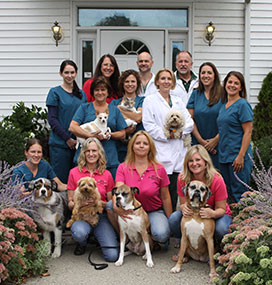Clinic Memorial Program helps vets and their clients

Pet owners often turn to their veterinarians for health information, and the Baker Institute for Animal Health is helping our partner clinics provide accurate, up-to-date information their clients need with a new series of infographics and fact sheets for clinics participating in our Clinic Memorial Giving Program. The infographics and fact sheets are a small token of our gratitude for the veterinarians who help animals every day in their practice and through their support of our research.
It is never easy when a pet passes away, but it helps when a veterinarian expresses condolences for their client in a way that offers meaningful comfort. Veterinarians who participate in our Clinic Memorial Program can make a gift to the Baker Institute for Animal Health in memory of a client’s lost pet as a way of offering solace to their clients while also extending the promise of a better future for animals by supporting the Institute’s work to improve the treatment and prevention of cancer, infectious disease, genetic disorders, and other illnesses.

“In my experience over 30 years of being a vet, there are no downsides to this program,” says Davis.
Our new infographics program begins with the headline-making outbreak of canine influenza. Here at the Baker Institute, we’re working hard to find answers about the H3N2 influenza outbreak and ways to treat and prevent this emerging disease. Dr. Colin Parrish and his team are studying the H3N2 canine influenza virus, investigating how the canine immune system reacts to it, and working with researchers at other institutions to create models of how the virus passes from dog to dog.
We have also created an electronic version of the canine influenza infographic that anyone can share via email, on a clinic website, or via social media. Visit our canine influenza updates page to download a copy of the infographic and fact sheets.
Veterinarians, we’d like to hear from you! If there are subjects relevant to your clients that you would like to see covered in an infographic please contact our Education and Outreach Coordinator, Merry Buckley, to provide your feedback and ideas: mrb46@cornell.edu.
This article originally appeared in our 2015 Annual Report.


